2017牛津译林版英语六年级上册Unit 7提优卷及答案
- 格式:doc
- 大小:323.50 KB
- 文档页数:5
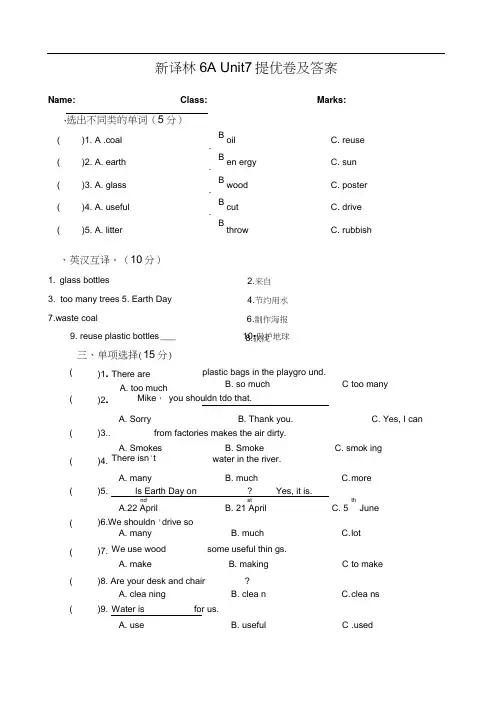
新译林6A Unit7提优卷及答案、英汉互译。
(10分)1. glass bottles3. too many trees 5. Earth Day 7.waste coal、选出不同类的单词(5分)( )1. A .coal B . oil C. reuse ( )2. A. earth B . en ergy C. sun ( )3. A. glass B . wood C. poster ( )4. A. useful B . cut C. drive ()5. A. litterB .throwC. rubbishClass:Name: Marks:( )1. There are A. too muchplastic bags in the playgro und.B. so muchC .too many()2.Mike , you shouldn tdo that.A. SorryB. Thank you.C. Yes, I can()3.. from factories makes the air dirty.A. SmokesB. SmokeC. smok ing()4. There isn 'twater in the river.A. manyB. muchC. m ore()5. Is Earth Day on?Yes, it is.nd stthA.22 AprilB. 21 AprilC. 5 June()6.We shouldn 'drive soA. manyB. muchC. l ot()7. We use woodsome useful thin gs.A. makeB. making C .to make()8. Are your desk and chair?A. clea ningB. clea nC. c lea ns()9. Water isfor us.A. useB. usefulC .used10•保护地球 2.来自 4.节约用水 6.制作海报 8.砍伐9. reuse plastic bottles ___三、单项选择(15分)2. they, plastic, use, to, bags, make(.)3. trees, keep, help, air, the, clea n (.)4. can, how, we, these, reuse, thin gs(?)5. is n ', there, coal, much, on, Earth(.)五、用所给词的适当形式填空。
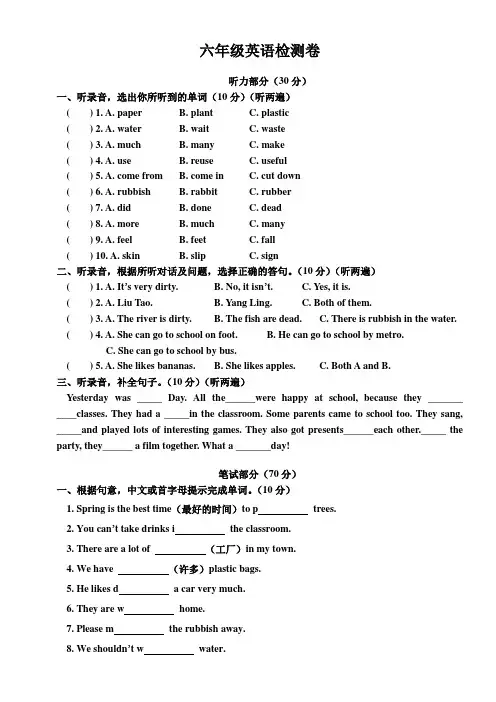
六年级英语检测卷听力部分(30分)一、听录音,选出你所听到的单词(10分)(听两遍)( ) 1. A. paper B. plant C. plastic( ) 2. A. water B. wait C. waste( ) 3. A. much B. many C. make( ) 4. A. use B. reuse C. useful( ) 5. A. come from B. come in C. cut down( ) 6. A. rubbish B. rabbit C. rubber( ) 7. A. did B. done C. dead( ) 8. A. more B. much C. many( ) 9. A. feel B. feet C. fall( ) 10. A. skin B. slip C. sign二、听录音,根据所听对话及问题,选择正确的答句。
(10分)(听两遍)( ) 1. A. It’s very dirty. B. No, it isn’t. C. Yes, it is.( ) 2. A. Liu Tao. B. Yang Ling. C. Both of them.( ) 3. A. The river is dirty. B. The fish are dead. C. There is rubbish in the water. ( ) 4. A. She can go to school on foot. B. He can go to school by metro.C. She can go to school by bus.( ) 5. A. She likes bananas. B. She likes apples. C. Both A and B.三、听录音,补全句子。
(10分)(听两遍)Yesterday was _____ Day. All the______were happy at school, because they _______ ____classes. They had a _____in the classroom. Some parents came to school too. They sang, _____and played lots of interesting games. They also got presents______each other._____ the party, they______ a film together. What a _______day!笔试部分(70分)一、根据句意,中文或首字母提示完成单词。
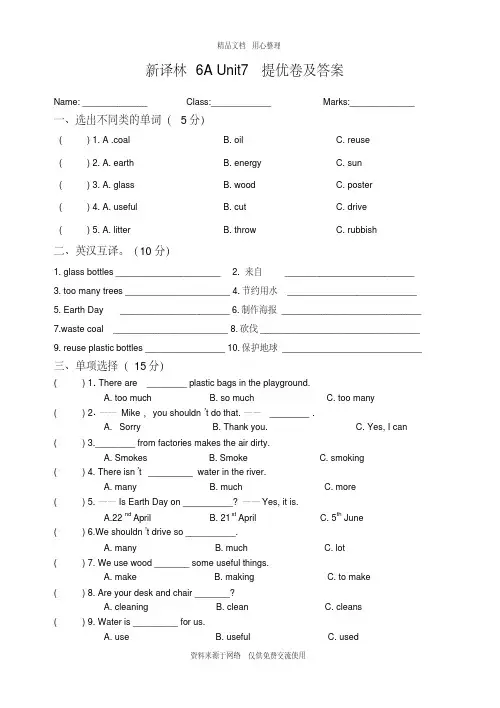
新译林6A Unit7提优卷及答案Name: _____________ Class:____________ Marks:_____________ 一、选出不同类的单词(5分)( ) 1. A .coal ( ) 2. A. earth ( ) 3. A. glass ( ) 4. A. useful ( ) 5. A. litter B. oilB. energyB. woodB. cutB. throwC. reuseC. sunC. posterC. driveC. rubbish二、英汉互译。
(10分)1. glass bottles _____________________2. 来自__________________________3. too many trees _____________________4.节约用水__________________________5. Earth Day ______________________6.制作海报____________________________7.waste coal _______________________8.砍伐________________________________9. reuse plastic bottles ________________ 10.保护地球____________________________三、单项选择(15分)( ) 1. There are ________ plastic bags in the playground.A. too muchB. so muchC. too many( ) 2.—— Mike,you shouldn’t do that. —— .A.SorryB. Thank you.C. Yes, I can ( ) 3.________ from factories makes the air dirty.A. SmokesB. SmokeC. smoking( ) 4. There isn’t water in the river.A. manyB. muchC. more( ) 5. ——Is Earth Day on __________? ——Yes, it is.A.22nd AprilB. 21st AprilC. 5th June( ) 6.We shouldn’t drive so __________.A. manyB. muchC. lot( ) 7. We use wood _______ some useful things.A. makeB. makingC. to make( ) 8. Are your desk and chair _______?A. cleaningB. cleanC. cleans( ) 9. Water is _________ for us.A. useB. usefulC. used( ) 10. We should _____ in the library.A. keep quietB. keeping quietC. kept quiet( ) 11. Those signs _________“Danger”.A. meansB. meanC. meaning( ) 12. Most of our energy ________ from oil.A. comeB. comesC. coming( ) 13.We _________ some cakes to the park and ________ them last Sunday.A. bring, eatB. brought, ateC. take, ate( ) 14. We shouldn’t __________in the street.A. litterB. letterC. littering( ) 15. Do you often use _______ bags and __________ bottles?A.paper, glassesB. papers, glassC. paper, glass四、连词成句。
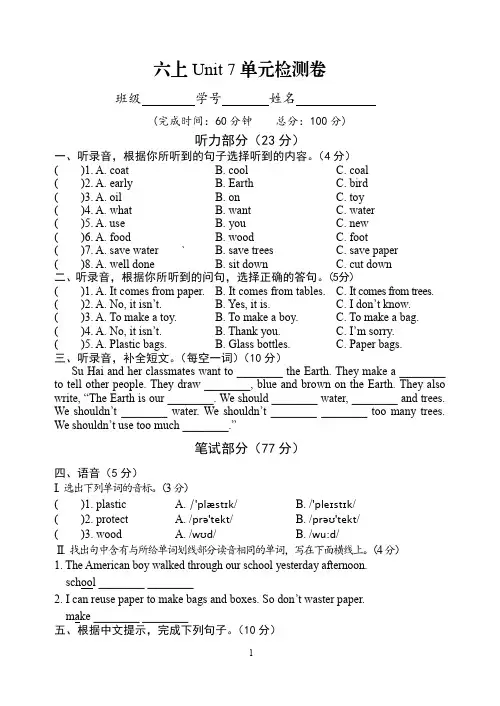
六上Unit7单元检测卷班级学号姓名(完成时间:60分钟总分:100分)听力部分(23分)一、听录音,根据你所听到的句子选择听到的内容。
(4分)( )1. A. coat B. cool C. coal( )2. A. early B. Earth C. bird( )3. A. oil B. on C. toy( )4. A. what B. want C. water( )5. A. use B. you C. new( )6. A. food B. wood C. foot( )7. A. save water ` B. save trees C. save paper( )8. A. well done B. sit down C. cut down二、听录音,根据你所听到的问句,选择正确的答句。
(5分)( )1. A. It comes from paper. B. It comes from tables. C. It comes from trees. ( )2. A. No, it isn’t. B. Yes, it is. C. I don’t know. ( )3. A. To make a toy. B. To make a boy. C. To make a bag. ( )4. A. No, it isn’t. B. Thank you. C. I’m sorry.( )5. A. Plastic bags. B. Glass bottles. C. Paper bags.三、听录音,补全短文。
(每空一词)(10分)Su Hai and her classmates want to ________ the Earth. They make a ________ to tell other people. They draw ________, blue and brown on the Earth. They also write, “The Earth is our ________. We should ________ water, ________ and trees. We shouldn’t ________ water. We shouldn’t ________ ________ too many trees. We shouldn’t use too much ________.”笔试部分(77分)四、语音(5分)I. 选出下列单词的音标。
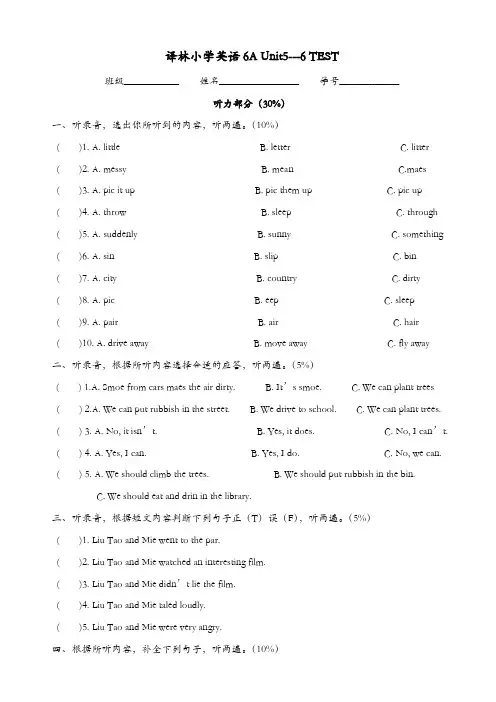
译林小学英语6A Unit5---6 TEST班级___________ 姓名________________ 学号____________听力部分(30%)一、听录音,选出你所听到的内容,听两遍。
(10%)( )1. A. little B. letter C. litter ( )2. A. messy B. mean C.maes ( )3. A. pic it up B. pic them up C. pic up ( )4. A. throw B. sleep C. through ( )5. A. suddenly B. sunny C. something ( )6. A. sin B. slip C. bin ( )7. A. city B. country C. dirty ( )8. A. pic B. eep C. sleep ( )9. A. pair B. air C. hair ( )10. A. drive away B. move away C. fly away 二、听录音,根据所听内容选择合适的应答,听两遍。
(5%)( ) 1.A. Smoe from cars maes the air dirty. B. It’s smoe. C. We can plant trees ( ) 2.A. We can put rubbish in the street. B. We drive to school. C. We can plant trees. ( ) 3. A. No, it isn’t. B. Yes, it does. C. No, I can’t. ( ) 4. A. Yes, I can. B. Yes, I do. C. No, we can. ( ) 5. A. We should climb the trees. B. We should put rubbish in the bin.C. We should eat and drin in the library.三、听录音,根据短文内容判断下列句子正(T)误(F),听两遍。
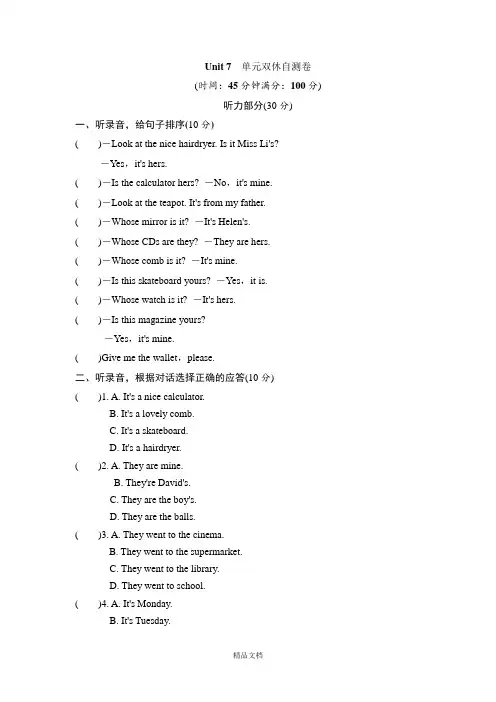
Unit 7单元双休自测卷(时间:45分钟满分:100分)听力部分(30分)一、听录音,给句子排序(10分)()-Look at the nice hairdryer. Is it Miss Li's?-Yes,it's hers.()-Is the calculator hers? -No,it's mine.()-Look at the teapot. It's from my father.()-Whose mirror is it? -It's Helen's.()-Whose CDs are they? -They are hers.()-Whose comb is it? -It's mine.()-Is this skateboard yours? -Yes,it is.()-Whose watch is it? -It's hers.()-Is this magazine yours?-Yes,it's mine.()Give me the wallet,please.二、听录音,根据对话选择正确的应答(10分)()1. A. It's a nice calculator.B. It's a lovely comb.C. It's a skateboard.D. It's a hairdryer.()2. A. They are mine.B. They're David's.C. They are the boy's.D. They are the balls.()3. A. They went to the cinema.B. They went to the supermarket.C. They went to the library.D. They went to school.()4. A. It's Monday.B. It's Tuesday.C. It's Wednesday.D. It's Thursday.()5. A. They're in my school bag.B. They are over there.C. They're on the desk.D. They are on the ground.三、听录音,填入所缺的单词(10分)________ are so ________ ________ under the Christmas ________.This one is from ________. Let's open it and ________ a look.Ah,it's a ________.I like the ________ very much. That one is from Dad.It's a new ________.They are ________.笔试部分(70分)四、小判官,判断下列单词中画线部分的发音是否相同,用“√”或“×”表示(5分)()1. comb come()2. ask answer()3. teapot brother()4. from photo()5. wallet let()6. toyboy()7. seesweater()8. big drink五、词汇俱乐部(5分)1. watch(复数) ______________2. my(宾格) ________________3. we(名词性物主代词)______________4. his(主格)______________5. who's(完全形式)________________6. hers (复数形式)_______________7. they (形容词性物主代词)____________8. man (对应词) _________________9. right (同音词)______________10. sun(形容词)_____________六、群龙有首(6分)1. Can you a_______ my question?2. He pointed to the man b_______ him.3. Miss Li is standing in f_______ of us.4. These are not their presents. T______ are over there.5.—W_____ is this mirror?—It's m______.七、精挑细选(10分)()1. On Sunday,Jim's family were at his ________ house. They were very happy.A. GrandpaB. Grandpa'sC. brotherD. friends()2. Here's a photo of ________ family for you.May I have one of ________?A. yours;myB. my;yoursC. your;myD. yours;mine()3. I've got two presents ________ Mum and Dad.A. ofB. inC. withD. from()4. This morning I ________ a Walkman under the Christmas tree.A. seeB. sawC. seenD. seeing()5. Help ________ answer the questions.A. IB. myC. meD. mine()6. Where are ________?A. theirB. theirsC. theirs'D. their's()7. I was at home ________ my parents last Sunday.A. toB. forC. withD. of()8.They asked ________ some questions ________ English.A. me;aboutB. I;aboutC. I;withD. me;with()9. It was ________ ________ 2nd of April.A. on /B. on theC. in theD. in /()10. The bus ________ and some ________ got off.A. stoped;peopleB. stopped;peopleC. stop;peopleD. stop;peoples八、句子加工厂(5分)1. Christmas is on_the_25th_of_Dec. (对画线部分提问)________ ________ Christmas?2. The teapot is my_grandparents'. (对画线部分提问)________ ________ the teapot?3. This present is from my_parents. (对画线部分提问)________ is the present ________?4.visit,we,relatives,friends,usually,and (.)(连词成句) _____________________________________5. the,blue,not,wallet,is,mine (.) (连词成句)___________________________________九、小小诊断所,找错并改正(5分)1. “Whose wallet is this?” I asked the manA Bin frontme.()________C D2. -Whose your present from?A B-I t’sfrom my brother.()_______C D3. -Mum,shall we went to the libraryA Bby bus?-OK.()________C D4. These earphones are Lucy’s. They’reA B Chis.()________D2.-What day is it today?A B-It's the second of September.()________C D十、单词百变屋(10分)1. Mary's brother likes ________(run).2. ________(you) orange is on the desk.3.Let's ________(eat) some hamburgers. We are hungry.4. This is ________(I).5.-Whatwould you like?-I'd like ________(drink) some coffee.6. The football match is very ________(excite).7. John can speak ________(China).8.-Are these ________(them) carrots?-No,they're ________(our).9. Would you like ________(some) chocolate?10.There ________(be) an elephant and some tigers in the zoo.十一、完形填空(10分)Here is a __1__ of my __2__ __3__ the wall. My father is __4__ on the sofa and __5__ books. My mother is __6__ TV. My sister,Lily,is playing __7__ her toy. There is a CD __8__ on the table. That's __9__. I like it very much. It's a birthday present __10__ my parents.()1. A. pictures B. clockC. photo D. map()2. A. father B. motherC. sister D. family()3. A. on B. inC. between D. under()4. A. walking B. runningC. sleepingD. sitting()5. A. read B. watchingC. reading D. watch()6. A. seeing B. watchingC. lookingD. reading()7. A. with B. andC. to D. for()8. A. walkmanB. WalkmanC. radio D. tape()9. A. mine B. myC. his D. its()10. A. for B. toC. from D. with十二、快乐阅读(10分)ALast Saturday morning,Lucy went to a supermarket. She wanted to buy a big cake for her mother's birthday. There were many people in the supermarket. Suddenly,Lucy saw a beautiful wallet on the floor.“Whose wallet is it?”she asked,but nobody answered.“Excuse me,is this wallet yours,sir?” she asked the man in front of her.“No,it isn't.” the man said. “Perhaps it's hers.”He pointed the woman in front of him.“Is this wallet yours?” she asked the woman.“Let me have a look.Oh,yes,it is.Thank you very much.”判断正误,用“T”或“F”表示。
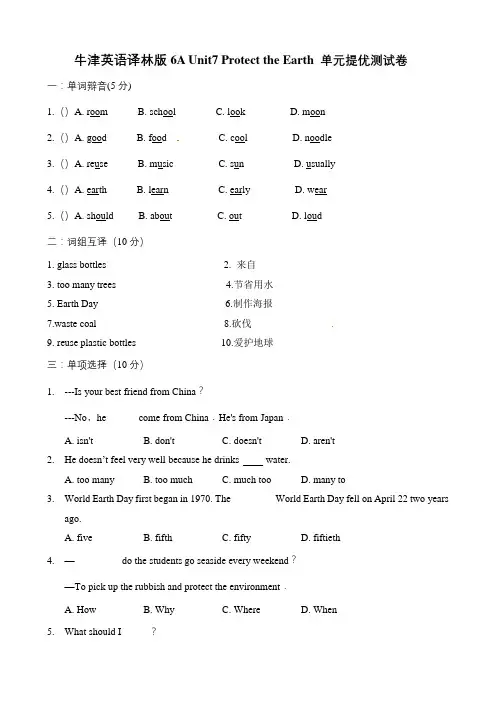
牛津英语译林版6A Unit7 Protect the Earth 单元提优测试卷一:单词辩音(5分)1.()A. room B. school C. look D. moon2.()A. good B. food C. cool D. noodle3.()A. reuse B. music C. sun D. usually4.()A. earth B. learn C. early D. wear5.()A. should B. about C. out D. loud二:词组互译(10分)1. glass bottles _____________________2. 来自__________________________3. too many trees _____________________4.节省用水__________________________5. Earth Day ______________________6.制作海报____________________________7.waste coal _______________________ 8.砍伐________________________________9. reuse plastic bottles ________________ 10.爱护地球____________________________三:单项选择(10分)1.---Is your best friend from China---No,he______ come from China.He's from Japan.A. isn'tB. don'tC. doesn'tD. aren't2.He doesn’t feel very well because he drinks water.A. too manyB. too muchC. much tooD. many to3.World Earth Day first began in 1970. The ________ World Earth Day fell on April 22 two yearsago.A. fiveB. fifthC. fiftyD. fiftieth4.—_________ do the students go seaside every weekend—To pick up the rubbish and protect the environment.A. HowB. WhyC. WhereD. When5.What should I _____?A. didB. doesC. doD. doing6.Small things can make a big difference to the environment.In daily life,we can _______ toprotect the environment.①give food to homeless people②use cloth bags instead of(代替)plastic bags③turn off the lights when leaving a room④help the old people in the neighborhood(街区)⑤ride bikes or walk to school instead of going to school by carA. ②④⑤B. ①③④C. ②③⑤D. ①②③7. There is a lot of ________in the river.A.fish B.rubbish C.boats D. fishes8. People use cups water.A.drink B.to drink C.drinking D.drinks9.Are your desk and chair _______?A. cleaningB. cleanC. cleansD. cleaned10. Protecting the Earth is protecting ourselves.A. 爱护地球就是爱护别人B。
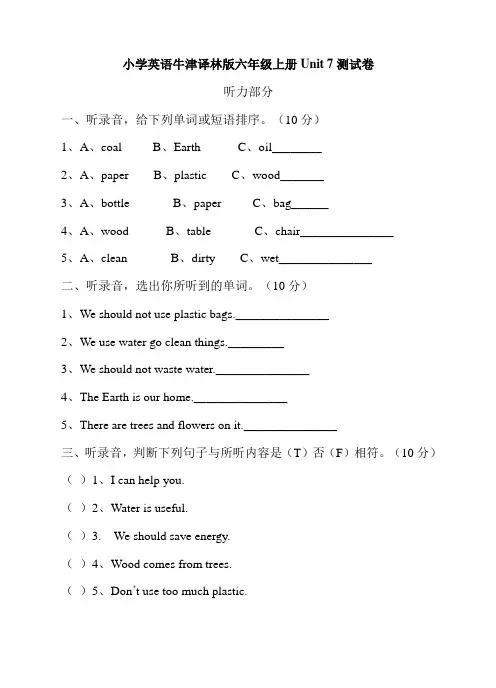
小学英语牛津译林版六年级上册Unit 7测试卷听力部分一、听录音,给下列单词或短语排序。
(10分)1、A、coal B、Earth C、oil________2、A、paper B、plastic C、wood_______3、A、bottle B、paper C、bag______4、A、wood B、table C、chair_______________5、A、clean B、dirty C、wet_______________二、听录音,选出你所听到的单词。
(10分)1、We should not use plastic bags._______________2、We use water go clean things._________3、We should not waste water._______________4、The Earth is our home._______________5、There are trees and flowers on it._______________三、听录音,判断下列句子与所听内容是(T)否(F)相符。
(10分)()1、I can help you.()2、Water is useful.()3. We should save energy.()4、Wood comes from trees.()5、Don’t use too much plastic.笔试部分一、按要求写出单词或短语。
(10分)1、protect the Earth (汉语)_______2、来自(英语)______3、砍倒(英语)_______4、玻璃瓶(英语)_____5、waste water(汉语)_________6、should(否定形式)________7、Earth Day (汉语)__________8、at the school gate(汉语).__________9、save energy(汉语)__________ 10、keep the air clean(汉语)__________二、单项选择(10分)()1、There ____ two pairs of glasses on the TV just now.A、wereB、wasC、are()2、When is Earth Day? It’s ____ the 22th ____ April.A、on...ofB、at... inC、on...on()3、That sign means you can not ____ here.A、no smokingB、smokingC、smoke()4、Are the students _____ the magazines in the library now?A、watchingB、seeingC、reading()5、We ____ use too many plastic bags.A、shouldB、shouldn’tC、can()6、--____ you have a party last night? --No, I _____.A、Do; don’tB、Did; don’tC、Did; didn’t()7、Reading in bed is ____ for our eyes.A、usefulB、badC、good()8、There are ____ plastic bags in the playground.A、too muchB、so muchC、too many()9、Water is _____ for us.A、useB、usefulC、used()10、____ a nice poster!A、WhatB、HowC、What’s三、根据句义及首字母或图片提示,补全单词,完成句子。
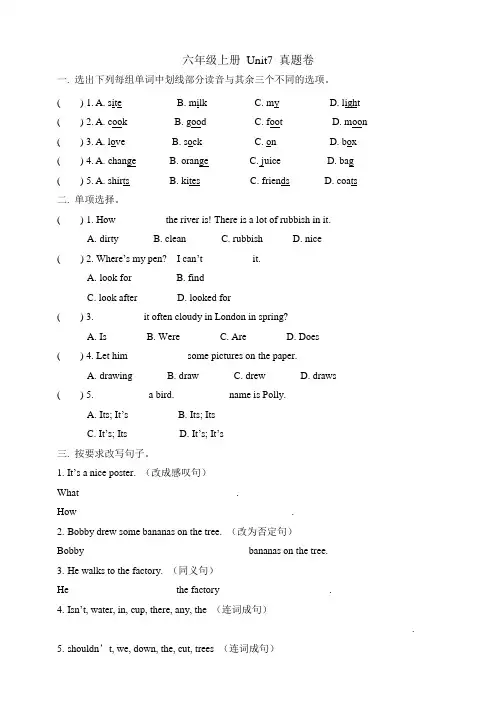
六年级上册Unit7 真题卷一.选出下列每组单词中划线部分读音与其余三个不同的选项。
( ) 1. A. site B. milk C. my D. light( ) 2. A. cook B. good C. foot D. moon( ) 3. A. love B. sock C. on D. box( ) 4. A. change B. orange C. juice D. bag( ) 5. A. shirts B. kites C. friends D. coats二. 单项选择。
( ) 1. How _________ the river is! There is a lot of rubbish in it.A.dirtyB. cleanC. rubbishD. nice( ) 2. Where’s my pen? I can’t _________ it.A.look forB. findC. look afterD. looked for( ) 3. _________ it often cloudy in London in spring?A.IsB. WereC. AreD. Does( ) 4. Let him ___________ some pictures on the paper.A.drawingB. drawC. drewD. draws( ) 5. __________ a bird. __________ name is Polly.A.Its; It’sB. Its; ItsC. It’s; ItsD. It’s; It’s三. 按要求改写句子。
1. It’s a nice poster. (改成感叹句)What __________ __________ __________.How __________ __________ __________ ___________.2.Bobby drew some bananas on the tree. (改为否定句)Bobby __________ __________ ___________ bananas on the tree.3.He walks to the factory. (同义句)He __________ __________ the factory __________ ___________.4.Isn’t, water, in, cup, there, any, the (连词成句)_______________________________________________________________________.5.shouldn’t, we, down, the, cut, trees (连词成句)_______________________________________________________________________.四.根据单词适当形式填空,每空一词。
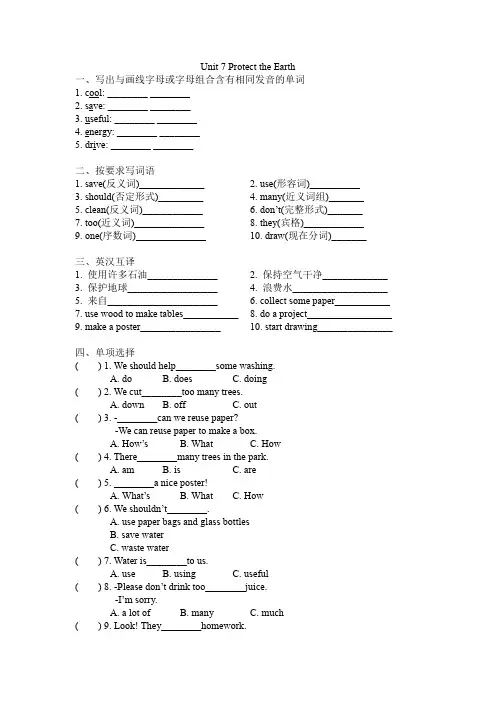
Unit 7 Protect the Earth一、写出与画线字母或字母组合含有相同发音的单词1. cool: ________ ________2. save: ________ ________3. useful: ________ ________4. energy: ________ ________5. drive: ________ ________二、按要求写词语1. save(反义词)_____________2. use(形容词)__________3. should(否定形式)_________4. many(近义词组)_______5. clean(反义词)____________6. don’t(完整形式)_______7. too(近义词)______________ 8. they(宾格)____________9. one(序数词)______________ 10. draw(现在分词)_______三、英汉互译1. 使用许多石油______________2. 保持空气干净_____________3. 保护地球__________________4. 浪费水___________________5. 来自______________________6. collect some paper___________7. use wood to make tables___________8. do a project_________________9. make a poster________________ 10. start drawing_______________四、单项选择( ) 1. We should help________some washing.A. doB. doesC. doing( ) 2. We cut________too many trees.A. downB. offC. out( ) 3. -________can we reuse paper?-We can reuse paper to make a box.A. How’sB. WhatC. How( ) 4. There________many trees in the park.A. amB. isC. are( ) 5. ________a nice poster!A. What’sB. WhatC. How( ) 6. We shouldn’t________.A. use paper bags and glass bottlesB. save waterC. waste water( ) 7. Water is________to us.A. useB. usingC. useful( ) 8. -Please don’t drink too________juice.-I’m sorry.A. a lot ofB. manyC. much( ) 9. Look! They________homework.A. are doing theyB. do theirC. are doing their ( ) 10. -Please tell________about your school.-OK.A. myB. meC. I五、用should或shouldn’t填空1. You________shout in the classroom.2. You________save energy.3. You________use paper bags and glass bottles.4. We________cut down too many trees.5. We________save trees.六、根据中文提示,补全句子或对话1. 我们应该使用玻璃瓶和纸袋。
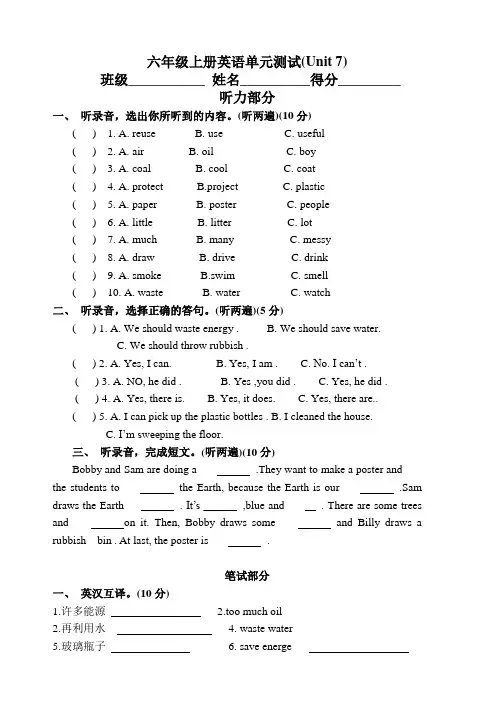
六年级上册英语单元测试(Unit 7)班级___________ 姓名__________得分_________听力部分一、听录音,选出你所听到的内容。
(听两遍)(10分)( ) 1. A. reuse B. use C. useful( ) 2. A. air B. oil C. boy( ) 3. A. coal B. cool C. coat( ) 4. A. protect B.project C. plastic( ) 5. A. paper B. poster C. people( ) 6. A. little B. litter C. lot( ) 7. A. much B. many C. messy( ) 8. A. draw B. drive C. drink( ) 9. A. smoke B.swim C. smell( ) 10. A. waste B. water C. watch二、听录音,选择正确的答句。
(听两遍)(5分)( ) 1. A. We should waste energy . B. We should save water.C. We should throw rubbish .( ) 2. A. Yes, I can. B. Yes, I am . C. No. I can’t .( ) 3. A. NO, he did . B. Yes ,you did . C. Yes, he did .( ) 4. A. Yes, there is. B. Yes, it does. C. Yes, there are..( ) 5. A. I can pick up the plastic bottles . B. I cleaned the house.C. I’m sweeping the floor.三、听录音,完成短文。
(听两遍)(10分)Bobby and Sam are doing a ___ .They want to make a poster and ___ the students to ___ the Earth, because the Earth is our ___ .Sam draws the Earth___ . It’s ___,blue and ___ . There are some trees and ___ on it. Then, Bobby draws some ___ and Billy draws a rubbish bin . At last, the poster is ___ .笔试部分一、英汉互译。
新译林6A Unit7提优卷及答案Name: _____________ Class:____________ Marks:_____________ 一、选出不同类的单词(5分)( ) 1. A .coal ( ) 2. A. earth ( ) 3. A. glass ( ) 4. A. useful ( ) 5. A. litter B. oilB. energyB. woodB. cutB. throwC. reuseC. sunC. posterC. driveC. rubbish二、英汉互译。
(10分)1.glass bottles _____________________2. 来自__________________________3.too many trees _____________________4.节约用水__________________________5.Earth Day ______________________6.制作海报____________________________7.waste coal _______________________8.砍伐________________________________9. reuse plastic bottles ________________ 10.保护地球____________________________三、单项选择(15分)( ) 1.There are ________ plastic bags in the playground.A. too muchB. so muchC. too many( ) 2.—— Mike,you shouldn’t do that. —— .A.SorryB. Thank you.C. Yes, I can( ) 3.________ from factories makes the air dirty.A. SmokesB. SmokeC. smoking( ) 4.There isn’t water in the river.A. manyB. muchC. more( ) 5. ——Is Earth Day on __________? ——Yes, it is.A.22nd AprilB. 21st AprilC. 5th June( ) 6.We shouldn’t drive so __________.A. manyB. muchC. lot( ) 7. We use wood_______ some useful things.A. makeB. makingC. to make( ) 8. Are your desk and chair _______?A. cleaningB. cleanC. cleans( ) 9. Water is _________ for us.A. useB. usefulC. used( ) 10. We should _____ in the library.A. keep quietB. keeping quietC. kept quiet( ) 11. Those signs _________“Danger”.A. meansB. meanC. meaning( ) 12.Most of our energy ________ from oil.A. comeB. comesC. coming( ) 13.We _________ some cakes to the park and ________ them last Sunday.A. bring, eatB. brought, ateC. take, ate( ) 14.We shouldn’t __________in the street.A. litterB. letterC. littering( ) 15. Do you often use _______ bags and __________ bottles?A.paper, glassesB. papers, glassC. paper, glass四、连词成句。
Unit7Protect the earth【必背词汇】1.protect保护2.Earth地球3.save节约eful有用的5.much很多6.waste浪费7.reuse再利用8.energy能源9.most大部分e from从……来,来自11.coal煤炭12.oil石油13.drive开车,驾驶14.wood木头15.other其他的16.cut down砍伐,砍掉17.too many太多18.too much太多19.plastic塑料20.glass玻璃21.project课题22.poster海报23.gate大门24.22nd(twenty-second)第2225.April四月26.June六月27.5th(fifth)第五28.river河29.environment环境【必背词组或短语】1.protect the earth保护地球2.save water节约水e water to clean things用水洗东西4.every day每天5.in many places在许多地方6.much water许多水7.waste water浪费水8.reuse the water再利用水9.most of the energy大多数能源e from来自11.save energy节约能源12.so much如此多(的)13.on Earth在地球上e a lot of energy使用许多能源e wood to make tables用木头做桌子16.make chairs and tables制作桌椅17.many other things许多其他东西18.cut down砍伐,砍掉19.too many太多(可数名词复数)20.too much太多(不可数名词)21.be bad for…对……不好22.paper bags纸袋23.glass bottles玻璃瓶24.help keep the air clean帮助保持空气干净25.collect some paper收集一些纸26.plastic bags/bottles塑料袋/瓶27.reuse these things再利用这些东西28.Earth Day地球日29.reuse paper to make a box再利用纸做一个盒子30.reuse a plastic bottle to make a toy再利用塑料瓶做一个玩具31.on22nd April在4月22日32.World Environment Day世界环境日33.do a project做课题34.make a poster做张海报35.tell sb.about sth.告诉某人有关某事36.start drawing开始画画37.look nice看上去漂亮38.a rubbish bin一个垃圾桶39.at the school gate在学校门口40.What a nice poster!多么漂亮的一张海报啊!41.shouldn’t litter不应该扔垃圾42.really cool真的很酷43.have fun玩得开心44.let me do sth.让我来做某事45.on the tree(水果)在树上46.be ready准备好47.all students所有的学生48.every morning/afternoon每天早上/下午【语法】情态动词:情态动词本身有一定的词义,但不能单独使用,必须与后面的动词原形(行为动词、系动词)构成句子的谓语,情态动词无人称和数的变化。
译林版(三起)英语六年级上册 Unit 7 Protect theEarth 单元测试卷一、选择题( ) A. were B. was C. are2.Are the students _____ the magazines in the library now? ( ) A. watching B. seeing C. reading3.We ____ use too many plastic bags. ( ) A. should B. shouldn't C. can4.—When is Earth Day? ( ) —It's ____ the 22th ____ April. A. on...of B. at... in C. on...on5.That sign means you can not ____ here. ( ) A. no smoking B. smoking C. smoke6.There are ________ plastic bags in the playground. ( ) A. too much B. so much C. too many7.____ a nice poster! ( ) A. What B. How C. What's8.Water is _____ for us. ( )A. useB. usefulC. used 9.Reading in bed is ____ for our eyes. ( ) A. useful B. bad C. good10.---____ you have a party last night? ( )---No, I _____. A.Do; don’t B.Did; don’tC.Did; didn’t二、阅读理解误(F )。
(在……期间)this long holiday, Wang Bing did (等). When Wang Bing threw(扔) bananas to ) very excited.当……的时候) grandpa showed some old photos to 过去). Wang Bing’s mother and grandma (_______)(_______) (_______) (_______) 他们自己) very much. (_______) 三、单词拼写____ water. _____bags or bottles.comes from trees._______ .四、填空题21.protect the Earth (汉语)_______22.来自 (英语)________23.砍倒 (英语)_______24.玻璃瓶(英语)_________25.waste water(汉语)_________26.should(否定形式)________27.Earth Day (汉语)__________28.at the school gate(汉语).__________29.save energy(汉语)__________30.keep the air clean(汉语)__________用所给词的适当形式填空。
Unit 7单元双休自测卷(时间:45分钟满分:100分)听力部分(30分)一、听录音,给句子排序(10分)()-Look at the nice hairdryer. Is it Miss Li's?-Yes,it's hers.()-Is the calculator hers? -No,it's mine.()-Look at the teapot. It's from my father.()-Whose mirror is it? -It's Helen's.()-Whose CDs are they? -They are hers.()-Whose comb is it? -It's mine.()-Is this skateboard yours? -Yes,it is.()-Whose watch is it? -It's hers.()-Is this magazine yours?-Yes,it's mine.()Give me the wallet,please.二、听录音,根据对话选择正确的应答(10分)()1. A. It's a nice calculator.B. It's a lovely comb.C. It's a skateboard.D. It's a hairdryer.()2. A. They are mine.B. They're David's.C. They are the boy's.D. They are the balls.()3. A. They went to the cinema.B. They went to the supermarket.C. They went to the library.D. They went to school.()4. A. It's Monday.B. It's Tuesday.C. It's Wednesday.D. It's Thursday.()5. A. They're in my school bag.B. They are over there.C. They're on the desk.D. They are on the ground.三、听录音,填入所缺的单词(10分)________ are so ________ ________ under the Christmas ________.This one is from ________. Let's open it and ________ a look.Ah,it's a ________.I like the ________ very much. That one is from Dad.It's a new ________.They are ________.笔试部分(70分)四、小判官,判断下列单词中画线部分的发音是否相同,用“√”或“×”表示(5分)()1. comb come()2. ask answer()3. teapot brother()4. from photo()5. wallet let()6. toyboy()7. seesweater()8. big drink五、词汇俱乐部(5分)1. watch(复数) ______________2. my(宾格) ________________3. we(名词性物主代词)______________4. his(主格)______________5. who's(完全形式)________________6. hers (复数形式)_______________7. they (形容词性物主代词)____________8. man (对应词) _________________9. right (同音词)______________10. sun(形容词)_____________六、群龙有首(6分)1. Can you a_______ my question?2. He pointed to the man b_______ him.3. Miss Li is standing in f_______ of us.4. These are not their presents. T______ are over there.5.—W_____ is this mirror?—It's m______.七、精挑细选(10分)()1. On Sunday,Jim's family were at his ________ house. They were very happy.A. GrandpaB. Grandpa'sC. brotherD. friends()2. Here's a photo of ________ family for you.May I have one of ________?A. yours;myB. my;yoursC. your;myD. yours;mine()3. I've got two presents ________ Mum and Dad.A. ofB. inC. withD. from()4. This morning I ________ a Walkman under the Christmas tree.A. seeB. sawC. seenD. seeing()5. Help ________ answer the questions.A. IB. myC. meD. mine()6. Where are ________?A. theirB. theirsC. theirs'D. their's()7. I was at home ________ my parents last Sunday.A. toB. forC. withD. of()8.They asked ________ some questions ________ English.A. me;aboutB. I;aboutC. I;withD. me;with()9. It was ________ ________ 2nd of April.A. on /B. on theC. in theD. in /()10. The bus ________ and some ________ got off.A. stoped;peopleB. stopped;peopleC. stop;peopleD. stop;peoples八、句子加工厂(5分)1. Christmas is on_the_25th_of_Dec. (对画线部分提问)________ ________ Christmas?2. The teapot is my_grandparents'. (对画线部分提问)________ ________ the teapot?3. This present is from my_parents. (对画线部分提问)________ is the present ________?4.visit,we,relatives,friends,usually,and (.)(连词成句) _____________________________________5. the,blue,not,wallet,is,mine (.) (连词成句)___________________________________九、小小诊断所,找错并改正(5分)1. “Whose wallet is this?” I asked the manA Bin frontme.()________C D2. -Whose your present from?A B-I t’sfrom my brother.()_______C D3. -Mum,shall we went to the libraryA Bby bus?-OK.()________C D4. These earphones are Lucy’s. They’reA B Chis.()________D2.-What day is it today?A B-It's the second of September.()________C D十、单词百变屋(10分)1. Mary's brother likes ________(run).2. ________(you) orange is on the desk.3.Let's ________(eat) some hamburgers. We are hungry.4. This is ________(I).5.-Whatwould you like?-I'd like ________(drink) some coffee.6. The football match is very ________(excite).7. John can speak ________(China).8.-Are these ________(them) carrots?-No,they're ________(our).9. Would you like ________(some) chocolate?10.There ________(be) an elephant and some tigers in the zoo.十一、完形填空(10分)Here is a __1__ of my __2__ __3__ the wall. My father is __4__ on the sofa and __5__ books. My mother is __6__ TV. My sister,Lily,is playing __7__ her toy. There is a CD __8__ on the table. That's __9__. I like it very much. It's a birthday present __10__ my parents.()1. A. pictures B. clockC. photo D. map()2. A. father B. motherC. sister D. family()3. A. on B. inC. between D. under()4. A. walking B. runningC. sleepingD. sitting()5. A. read B. watchingC. reading D. watch()6. A. seeing B. watchingC. lookingD. reading()7. A. with B. andC. to D. for()8. A. walkmanB. WalkmanC. radio D. tape()9. A. mine B. myC. his D. its()10. A. for B. toC. from D. with十二、快乐阅读(10分)ALast Saturday morning,Lucy went to a supermarket. She wanted to buy a big cake for her mother's birthday. There were many people in the supermarket. Suddenly,Lucy saw a beautiful wallet on the floor.“Whose wallet is it?”she asked,but nobody answered.“Excuse me,is this wallet yours,sir?” she asked the man in front of her.“No,it isn't.” the man said. “Perhaps it's hers.”He pointed the woman in front of him.“Is this wallet yours?” she asked the woman.“Let me have a look.Oh,yes,it is.Thank you very much.”判断正误,用“T”或“F”表示。
小学英语牛津译林版六年级上册Unit 7 Protect the Earth 测试题(含听力音频听力书面材料答案)一、听力部分(40分)听录音,选出你所听到的内容。
(10分)()1、A、out B、our C、house()2、A、Earth B、oil C、coal()3、A、wood B、plastic C、paper()4、A、bag B、bottle C、drive()5、A、come B、camp C、came二、听录音,判断下列句子与所听内容是(T)否(F)一致。
(10分)()1、Let’s draw some flowers here()2、We should put the poster at the school gate .()3、Most of our energy comes from coal and oil .()4、We should reuse and save water .()5、We should save energy .三、听录音,给所听问句选择恰当的答语。
(10分)()1、A、Plant more trees . B、Take the bus to school . C、Sweep the floor . ()2、A、Oil . B、Coal . C、Coal and oil . ()3、A、No , there isn’t . B、Yes , that is . C、Yes , there is . ()4、A、Yes , it is . B、Yes , they do . C、No , it isn’t .()5、A、To make a box and a toy . B、To make a toy . C、To make a box .四、听录音,把句子补充完整。
(10分)1、We use ______ to make bags and bottles .2、We should ______ trees .3、We shouldn’t ______ so much .4、I can ______ paper to make a box .5、We should ______ and ______ our Earth .笔试部分(60分)一、英汉互译。
(译林版)六年级英语上册试题Unit7 Protect the Earth单元测试卷(含答案)【精品】—、选出画线部分读音与其余三个不同的单词。
( ) 1. A. save B. paper C. glass D. waste ( ) 2. A. use B. under C. much D. cut( ) 3. A. book B. school C. look D. wood( ) 4. A. drive B. pick C. windy D. with( ) 5. A. early B. learn C. earth D. ear二、用所给单词的适当形式填空。
1. There ________ (be) much water on Earth.2. ________ (not use) too much plastic.3. Sam ________ (come) from the USA.4. We use the paper ________ (make) a paper plane.5. We clean ________ (we) classroom every day.6. ---Is the plastic bottle ________ (use)?---Yes, we can ________ (reuse) it.7. Bobby and Sam are ________ (do) a project.8. Let ________ (I) help you with your English.9. There aren’t ________ (some) apples in the basket.三、单项选择。
( ) 1. Can you draw ________ Earth?A. aB. anC. theD. /( ) 2. We need a lot of ________.A. energyB. energiesC. a energyD. an energy ( ) 3. There are ________ plastic bags and bottles around us.A. too manyB. too muchC. many tooD. much too ( ) 4. ---Where ________ Jim ________?---The USA.A. is; come fromB. does; fromC. is; fromD. does; comes from( ) 5. Doing eye exercises ________ our eyes.A. is good atB. are good atC. is good forD. are good for ( ) 6. We can reuse paper ________ boxes.A. makeB. makesC. makingD. to make ( ) 7. Earth Day is on ________A. lst AprilB. 22nd AprilC. 22nd MayD. 5th June ( ) 8. Let’s meet ________ the school gate.A. inB. onC. atD. for( ) 9. ________ nice poster!A. WhatB. What aC. HowD. How a ( ) 10. We should love ________ protect our Earth.A. andB. orC. withD. but四、连词成句。
新译林6A Unit7提优卷及答案Name: _____________ Class:____________ Marks:_____________ 一、选出不同类的单词(5分)( ) 1. A .coal ( ) 2. A. earth ( ) 3. A. glass ( ) 4. A. useful ( ) 5. A. litter B. oilB. energyB. woodB. cutB. throwC. reuseC. sunC. posterC. driveC. rubbish二、英汉互译。
(10分)1. glass bottles _____________________2. 来自__________________________3. too many trees _____________________4.节约用水__________________________5. Earth Day ______________________6.制作海报____________________________7.waste coal _______________________8.砍伐________________________________9. reuse plastic bottles ________________ 10.保护地球____________________________三、单项选择(15分)( ) 1. There are ________ plastic bags in the playground.A. too muchB. so muchC. too many( ) 2.—— Mike,you shouldn’t do that.—— .A.SorryB. Thank you.C. Yes, I can ( ) 3.________ from factories makes the air dirty.A. SmokesB. SmokeC. smoking( ) 4. There isn’t water in the river.A. manyB. muchC. more( ) 5. ——Is Earth Day on __________?——Yes, it is.A.22nd AprilB. 21st AprilC. 5th June( ) 6.We shouldn’t drive so __________.A. manyB. muchC. lot( ) 7. We use wood _______ some useful things.A. makeB. makingC. to make( ) 8. Are your desk and chair _______?A. cleaningB. cleanC. cleans( ) 9. Water is _________ for us.A. useB. usefulC. used( ) 10. We should _____ in the library.A. keep quietB. keeping quietC. kept quiet( ) 11. Those signs _________“Danger”.A. meansB. meanC. meaning( ) 12. Most of our energy ________ from oil.A. comeB. comesC. coming( ) 13.We _________ some cakes to the park and ________ them last Sunday.A. bring, eatB. brought, ateC. take, ate( ) 14. We shouldn’t __________in the street.A. litterB. letterC. littering( ) 15. Do you often use _______ bags and __________ bottles?A.paper, glassesB. papers, glassC. paper, glass四、连词成句。
(10分)1. we, reuse, should, water (.)_________________________________________________________________2. they, plastic, use, to, bags, make(.)_________________________________________________________________3. trees, keep, help, air, the, clean (.)_________________________________________________________________4. can, how, we, these, reuse, things(?)_________________________________________________________________5. isn’t, there, coal, much, on, Earth(.)_________________________________________________________________五、用所给词的适当形式填空。
(10分,每空1分)1. Wood _________(come) from trees.2. We should make _______(paper) bags and _________(glass) bottles.3. Water is ________(use).We drink water and use water __________(clean) things every day.We should keep the water in the river __________(clean).4. Sam starts _________(draw).5. We shouldn’t __________(litter) in the park.6. I know how ________ (protect) the Earth.7. Let’s make a _________(post) and tell them about it.六、根据图片情境,补全对话,每空一词。
(10分)1. A: What is she _______ now?B: She is putting_________ in the river.A: Can we ________ there?B: No, we can’t. We should _________ the water ________.2. A: Can we________ down too ______ trees?B: No, we _________.A: Why?B: Trees can keep the air _________.A: What can we use the wood to do?B: We can use the wood to________ tables, chairs and many other things.七、完型填空。
(10分)When you are in Britain you often see people go out 1 an umbrella or a raincoat on a sunny day. 2 ? Because the weather in Britain often changes (变化) 3 . The same weather doesn’t stay 4 . People can have four seasons in one day. In the morning the weather is warm like in 5 .After an hour, black 6 come and then it 7 . The weather gets 8 . In the afternoon it will be 9 .The sun will begin to shine, and it will be summer at this time of a day. The weather is always changing. How 10 it is!( ) 1. A. for B. with C. use( ) 2. A. Why B. What C. How( ) 3. A. big B. slowly C. quickly( ) 4. A. long B. short C. fast( ) 5. A. winter B. spring C. summer( ) 6. A. cloud B. clouds C. sky( ) 7. A. rains B. rained C. rainy( ) 8. A. cold B. hot C. warm( ) 9. A. cloudy B. sunny C. windy( ) 10. A. exciting B. useful C. interesting八、阅读理解。
(20分)(A)Now our cities become much greener. A lot of trees, grass and flowers are planted on both sides of the streets. There are many advantages (好处)because of them. First, trees, grass and flowers can make our cities more beautiful. Second, plants can keep the air clean because they absorb dioxide (吸收二氧化碳). Third ,plants can reduce (减少)the noise. Finally tress can make the weather cool in summer and warm in winter. Then how to make our cities greener? First, we should make people know the importance (重要性)of making cities greener. Next we should plant more tress, grass and flowers. And we should look after the tress, grass and flowers carefully.根据短文内容判断正(T)误(F)。